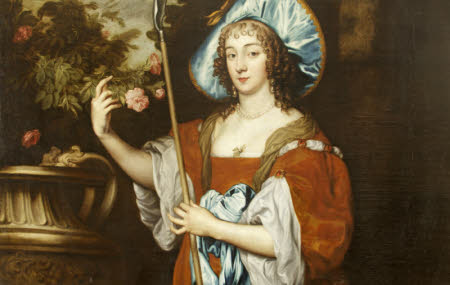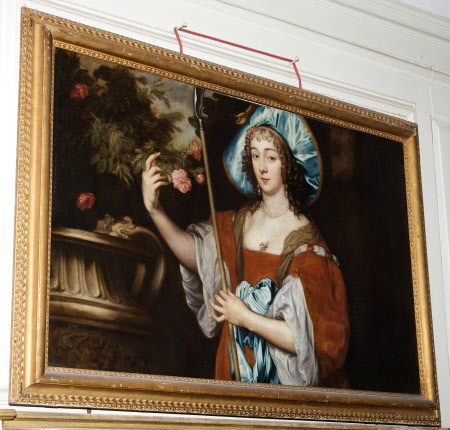Lady Dorothy Sydney, Lady Spencer, later Countess of Sunderland (1617-1684)
after Sir Anthony Van Dyck (Antwerp 1599 - London 1641)
Category
Art / Oil paintings
Date
1670 - 1699
Materials
Oil on canvas
Measurements
800 x 1257 mm (31 1/2 x 49 1/2 in)
Place of origin
England
Order this imageCollection
Lacock, Wiltshire
NT 996358
Caption
In about 1635, Lady Dorothy Sydney rejected a proposal of marriage from the poet Edmund Waller, who wrote poems to her, calling her ‘Sacharissa’. This composition was probably devised around the time of her marriage in 1639 to Henry, 3rd Lord Spencer of Wormleighton, who was created 1st Earl of Sunderland in 1643. She is shown as a shepherdess, carrying a crook, and holding a pink rose, a traditional attribute of Venus, goddess of love. Lord Spencer was killed at the First Battle of Newbury shortly after their marriage, leaving Dorothy with two children, and pregnant with a third, who died in infancy. The widowed countess lived at Brington, Northamptonshire, but eventually returned to live with her parents at Penshurst Place in Kent, where the original of this picture remains.
Summary
Oil painting on canvas, Lady Dorothy Sydney, Lady Spencer, later Countess of Sunderland (1617-1684), after Sir Anthony Van Dyck (Antwerp 1599 - London 1641), late 17th century, A horizontal half-length portrait of the Countess, in the guise of a shepherdess, with a crook in her left hand. Original generally thought to be at Penshurst Place, collection of the Viscount De L'Isle. There is another similar portrait thought to be by Lely, that was sold by the Earl of Darnley at Christies on 1st May 1925.
Provenance
Given by Matilda Theresa Talbot (formerly Gilchrist-Clark) (1871 – 1958), who gave the Abbey, the village of Lacock and the rest of the estate to the National Trust in 1944, along with 96 of the family portraits and other pictures, in 1948
Credit line
Lacock Abbey, The Talbot Collection (National Trust)
Makers and roles
after Sir Anthony Van Dyck (Antwerp 1599 - London 1641), artist

